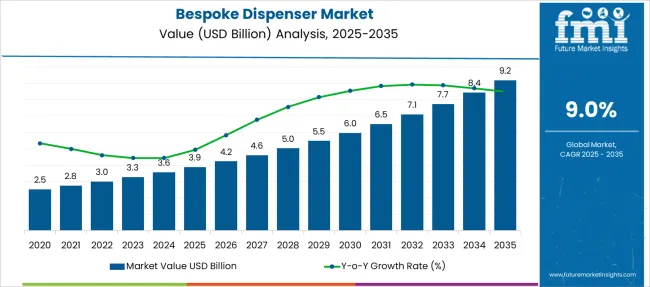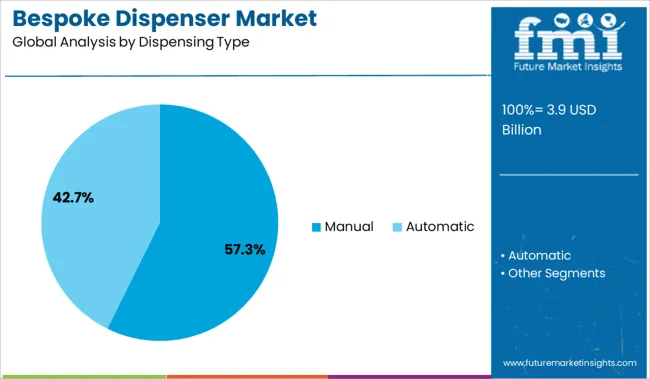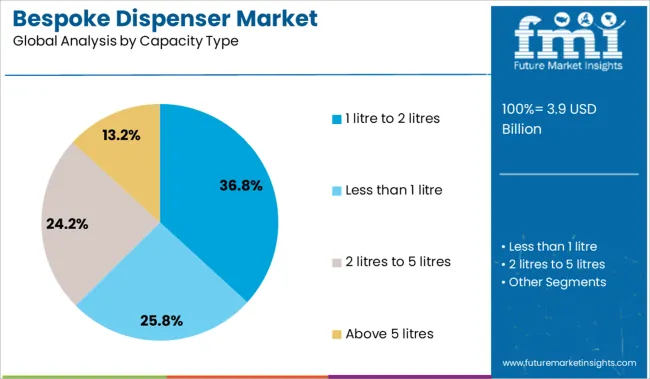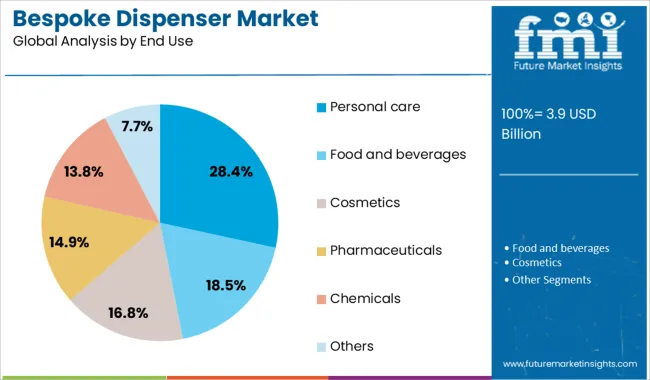The Bespoke Dispenser Market is estimated to be valued at USD 3.9 billion in 2025 and is projected to reach USD 9.2 billion by 2035, registering a compound annual growth rate (CAGR) of 9.0% over the forecast period.

| Metric | Value |
|---|---|
| Bespoke Dispenser Market Estimated Value in (2025 E) | USD 3.9 billion |
| Bespoke Dispenser Market Forecast Value in (2035 F) | USD 9.2 billion |
| Forecast CAGR (2025 to 2035) | 9.0% |
The bespoke dispenser market is evolving rapidly, driven by rising demand for customized dispensing solutions across hygiene, personal care, and hospitality sectors. Emphasis on brand differentiation, user convenience, and sustainability has influenced manufacturers to offer modular, refillable, and ergonomically designed dispensers tailored to end-user preferences.
Regulatory trends favoring reduced single-use packaging and enhanced product safety have further encouraged the transition toward dispensers that deliver controlled output, reduce contamination risk, and support eco-friendly formulations. Additionally, innovation in materials and dispensing mechanisms is enabling brands to meet specific viscosity, flow rate, and refillability needs.
The market is also benefiting from a convergence of aesthetics and function, as premium packaging becomes central to consumer purchasing behavior. Continued growth is expected as smart dispensing technologies, antimicrobial surfaces, and closed-loop refill models become more widely adopted across both residential and institutional channels.
The market is segmented by Dispensing Type, Capacity Type, and End Use and region. By Dispensing Type, the market is divided into Manual and Automatic. In terms of Capacity Type, the market is classified into 1 litre to 2 litres, Less than 1 litre, 2 litres to 5 litres, and Above 5 litres. Based on End Use, the market is segmented into Personal care, Food and beverages, Cosmetics, Pharmaceuticals, Chemicals, and Others. Regionally, the market is classified into North America, Latin America, Western Europe, Eastern Europe, Balkan & Baltic Countries, Russia & Belarus, Central Asia, East Asia, South Asia & Pacific, and the Middle East & Africa.

Manual dispensers are expected to lead the bespoke dispenser market with a projected 57.3% share of total revenue in 2025. This segment’s dominance is attributed to its simplicity, cost-efficiency, and compatibility with a wide range of product formulations.
Manual dispensers require no power source, making them ideal for use in low-maintenance environments such as public restrooms, hotel rooms, and retail outlets. Ease of operation, reliability, and lower manufacturing costs have reinforced their adoption across global markets, especially in settings where large-scale automation is not practical.
Recent improvements in pump mechanisms and leak-proof valves have further improved their user experience and durability. As companies aim for refillable and sustainable dispensing models, the manual segment continues to offer the most scalable solution for both low and mid-volume usage scenarios.

Dispenser models with a capacity between 1 litre to 2 litres are projected to account for 36.8% of the market share in 2025, making it the top-selling size category. This range provides an optimal balance between usability and refill frequency, particularly for high-traffic applications such as gyms, spas, hotels, and restrooms.
Larger capacity helps reduce operational downtime and labor costs associated with frequent refills, which is essential in commercial environments. These dispensers also align well with bulk product purchasing and refill packaging formats, which are increasingly being adopted to support sustainability goals.
The popularity of this capacity range is further supported by its compatibility with wall-mounted systems and countertop units, offering flexibility for deployment in both public and private settings.

The personal care segment is expected to lead the bespoke dispenser market with a projected 28.4% revenue share in 2025. Growth in this segment is being driven by rising demand for premium, hygienic, and user-centric packaging formats in products such as hand wash, shampoo, skincare, and body lotion.
Consumers are increasingly drawn to dispensers that provide controlled dosing, aesthetic appeal, and compatibility with high-viscosity formulations. The rise of refill stations in retail outlets and increased adoption of zero-waste personal care brands have created new opportunities for customized dispenser solutions.
As the personal care industry continues to emphasize clean beauty, natural formulations, and sustainable packaging, bespoke dispensers are serving as a key enabler of these values providing both functionality and brand identity reinforcement.
The bespoke dispenser market is vastly driven by the development of food & beverages sector. To expand geographical outreach, manufacturers of bespoke dispensers are focusing on product innovation and technological advancement. Bespoke dispensers are customized form of packaging which provides the convenience of product storage and transportation.
In addition to the transportation, bespoke dispensers offers manufacturers the leverage of easy customization to increase brand awareness. Bespoke dispensers limits the quantity of products to be dispensed resulting in the less wastage of the products. Bespoke dispensers have barrier properties such as anti-static, UV stability, moisture resistant etc. resulting in the protection of products from getting contaminated.
Bespoke dispensers have neat visual appeal, are easy to handle, economical, customizable, and provide extended shelf life to the products. Bespoke dispensers’ offers packaging solutions to many industries such as food and beverages, pharmaceuticals, chemical industries and others.
Increasing application and use of bespoke dispensers in food & beverages packaging, cosmetics, pharmaceutical packaging and others have propelled the growth of bespoke dispensers. Consumer preferences for easy to use and convenient packaging have resulted in the growth of bespoke dispensers market.
The factor accentuating the demand for bespoke dispensers market is that the bespoke dispensers limits the quantity of the products to be dispensed resulting in the less wastage of products. Bespoke dispensers have barrier properties such as moisture resistance, anti-static etc. resulting in the increased traction of bespoke dispensers in various environment conditions.
Moreover, manufacturers are focusing on product innovation and design to enhance product appeal. Bespoke dispensers are easy to handle such as replacement of empty ones with filled ones, bottom shape of bespoke dispensers ensures easy transportability etc.
Bespoke dispensers increases the shelf-life of the products by protecting them from contamination, resulting in the increasing demand of bespoke dispensers. Furthermore, increasing number of supermarkets, retail outlets etc. helps in driving the market share of bespoke dispensers. The key feature accelerating the market share of bespoke dispensers is that bespoke dispensers are hygienic, resulting in the product getting wasted by the hands of infants.
Despite the favourable conditions for the growth of bespoke dispensers market, there are certain factors that hinder the growth such as to provide limited quantity of products resulting in the long time taken for the high volume of the product to dispense. This has restricted the usage of bespoke dispensers for the products which are frequently used.
Bespoke dispensers market has been segmented on the basis of region into North America, Europe, Asia Pacific, Middle East & Africa (MEA), and Latin America. North America is expected to dominate the market share of bespoke dispensers due to the mature market and increased number of supermarkets, retail outlets etc.
The European region is estimated to register high CAGR owing to rise in disposable income, increased hygienic values etc. APAC region is anticipated to witness great opportunity in bespoke dispenser market owing to cheap availability of labour cost and reduced price of raw materials. MEA region is expected to witness a stagnated market in bespoke dispensers due to stagnating economy.
The global bespoke dispenser market is estimated to be valued at USD 3.9 billion in 2025.
The market size for the bespoke dispenser market is projected to reach USD 9.2 billion by 2035.
The bespoke dispenser market is expected to grow at a 9.0% CAGR between 2025 and 2035.
The key product types in bespoke dispenser market are manual and automatic.
In terms of capacity type, 1 litre to 2 litres segment to command 36.8% share in the bespoke dispenser market in 2025.






Full Research Suite comprises of:
Market outlook & trends analysis
Interviews & case studies
Strategic recommendations
Vendor profiles & capabilities analysis
5-year forecasts
8 regions and 60+ country-level data splits
Market segment data splits
12 months of continuous data updates
DELIVERED AS:
PDF EXCEL ONLINE
Market Share Breakdown of Bespoke Dispenser Manufacturers
Bespoke Packaging Market from 2024 to 2034
Oil Dispenser Market
Tape Dispenser Market Size and Share Forecast Outlook 2025 to 2035
Tape Dispenser Industry Analysis in Japan Size and Share Forecast Outlook 2025 to 2035
Tape Dispenser Industry Analysis in Western Europe Size and Share Forecast Outlook 2025 to 2035
Tray Dispensers Market Size and Share Forecast Outlook 2025 to 2035
Beer Dispensers Market Analysis - Size, Share, and Forecast Outlook 2025 to 2035
Soap Dispenser Market Trends - Demand & Forecast 2025 to 2035
Competitive Overview of Tape Dispenser Companies
Water Dispenser Market Trends - Growth & Demand Forecast 2025 to 2035
Strap Dispenser Market
Powder Dispenser Market Analysis by Product Type, Size, Dispensing Mode, End-use Industry, and Region through 2025 to 2035
Cereal and Dry Food Dispensers Market – Fresh & Convenient Dispensing 2025-2035
Key Players & Market Share in Powder Dispenser Manufacturing
Pump and Dispenser Market Size and Share Forecast Outlook 2025 to 2035
Beverage Dispenser Market Size and Share Forecast Outlook 2025 to 2035
Fountain Dispenser Equipment Industry Analysis in North America Growth, Trends and Forecast from 2025 to 2035
Examining Market Share Trends in the Pump and Dispenser Industry
Tear Tape Dispenser Market Size and Share Forecast Outlook 2025 to 2035

Thank you!
You will receive an email from our Business Development Manager. Please be sure to check your SPAM/JUNK folder too.
Chat With
MaRIA